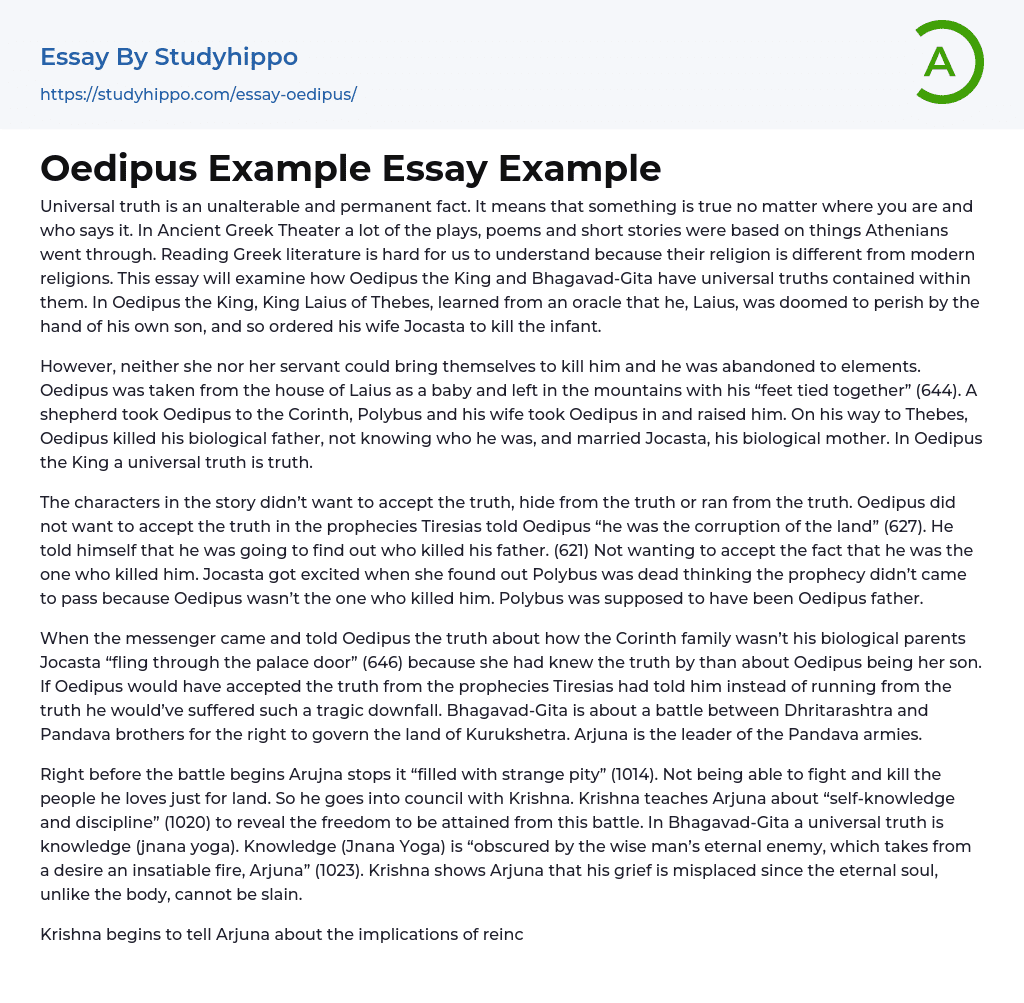The concept of universal truth concerns eternal and unchanging facts, regardless of location or speaker. The experiences of Athenians inspired Ancient Greek Theater, resulting in the creation of plays, poems, and short stories. However, understanding Greek literature can be difficult due to differences in religious beliefs compared to modern religions. This essay will examine the presence of universal truths in both Oedipus the King and Bhagavad-Gita. In Oedipus the King, King Laius of Thebes receives a prophecy from an oracle that his own son will kill him; as a result, he instructs his wife Jocasta to kill their child.
Both the woman and her servant chose not to kill Oedipus, so they decided to abandon him. As a baby, Oedipus was taken from Laius' home and left in the mountains with
...his "feet tied together" (644). Later, a shepherd brought Oedipus to Corinth where Polybus and his wife welcomed him and raised him. While traveling to Thebes, Oedipus unknowingly murdered his real father and went on to marry Jocasta, who turned out to be his biological mother. The play Oedipus the King explores the concept of a universal truth.
In the story, the characters showed different ways of dealing with or avoiding the truth. For example, Oedipus did not want to accept the truth that Tiresias's prophecies revealed - that he was responsible for the corruption in the land (627). Even though Oedipus was determined to find his father's killer (621), he refused to admit his own guilt. On the other hand, Jocasta felt relieved when she found out about Polybus' death because she believed it meant that Oedipus was no
the one who killed him. It was believed that Polybus was Oedipus' father.
In great distress, Jocasta hurried into the palace (646) after being informed by the messenger that Oedipus's true parents did not belong to the Corinth family. She was already aware that Oedipus was her own son. If Oedipus had accepted Tiresias' prophecies instead of avoiding them, he would have experienced a tragic downfall. The battle for control of Kurukshetra between Dhritarashtra and the Pandava brothers is recounted in the Bhagavad-Gita. Arjuna serves as the leader of the Pandava armies.
Arujna stops the battle right before it begins because he cannot bring himself to fight and kill the people he loves just for land. He is "filled with strange pity" (1014). Instead, Arjuna consults with Krishna, who teaches him about "self-knowledge and discipline" (1020). Krishna explains that the ultimate goal is to attain freedom from this battle. In Bhagavad-Gita, it is believed that knowledge (jnana yoga) is a universal truth. This knowledge is often obscured by a person's eternal enemy, which stems from desires and creates insatiable fire within them, such as in Arjuna's case (1023). Krishna shows Arjuna that his grief is misplaced because the eternal soul cannot be slain, unlike the physical body.
During the conversation between Krishna and Arjuna, they engage in discussing reincarnation and its implications. The main focus is on the concept of the "embodied self" (1017), urging Arjuna to distinguish between what is eternal and temporary. Through my analysis of both Oedipus the King and Bhagavad-Gita, I have discovered that they share universal truths. By drawing examples from my extensive familiarity with Oedipus the
King, which I have read four times previously, I demonstrated these truths. Reading Bhagavad-Gita provided me with a fascinating experience as it allowed me to comprehend and sympathize with Arjuna's hesitation towards harming his own family members. In general, Greek literature depicting ancient BC times brings me pleasure.
- Achilles essays
- Apollo essays
- Gilgamesh essays
- Hercules essays
- Iliad essays
- Myths essays
- Odysseus essays
- Oedipus essays
- Trojan War essays
- Zeus essays
- A Doll's House essays
- A Midsummer Night's Dream essays
- A raisin in the sun essays
- A Streetcar Named Desire essays
- An Inspector Calls essays
- Death of a salesman essays
- Everyman essays
- Fences essays
- Hamlet essays
- Hedda Gabler essays
- Iago essays
- King Lear essays
- Macbeth essays
- Much ado about nothing essays
- Oedipus Rex essays
- Oedipus The King essays
- Othello essays
- Pygmalion essays
- Romeo And Juliet essays
- Tartuffe essays
- The glass menagerie essays
- The Importance of Being Earnest essays
- The Merchant Of Venice essays
- The Taming of The Shrew essays
- Twelfth Night essays
- Waiting For Godot essays




